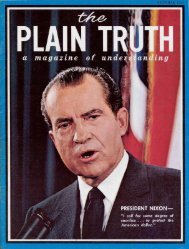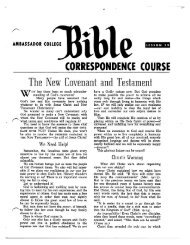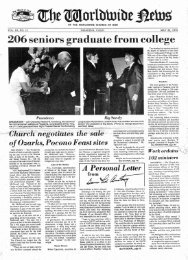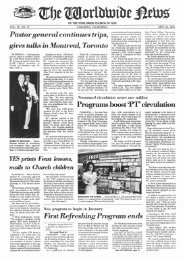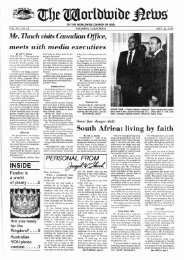Plain Truth 1959 (Vol XXIV No 03) Mar - Herbert W. Armstrong
Plain Truth 1959 (Vol XXIV No 03) Mar - Herbert W. Armstrong
Plain Truth 1959 (Vol XXIV No 03) Mar - Herbert W. Armstrong
Create successful ePaper yourself
Turn your PDF publications into a flip-book with our unique Google optimized e-Paper software.
The <strong>Plain</strong> <strong>Truth</strong> about the<br />
PROTESTANT Reformation<br />
Was the Reformation a return to the TRUTH preached by Jesus<br />
Christ? This series of articles contains startling FACTS which you<br />
need to consider!<br />
PART IX<br />
ILLION S of books, pamphlets<br />
M<br />
and tracts boldly proclaim as<br />
the Protestant foundation: "The<br />
BIBLE, the whole Bible, and nothing<br />
but the Bible, is the religion of Protestants."<br />
In the previous installments of this<br />
series, we learned from the Bible and<br />
the record of history that a remarkable<br />
change took place in nominal "Christianity"<br />
soon after the death of the<br />
original apostles. Pagan philosophies<br />
and traditions crept into the visible<br />
Church. During the "Dark Ages" the<br />
religious heirarchy became a veritable<br />
cesspool of iniquities, whoredorns and<br />
abominations of every description.<br />
We have seen how <strong>Mar</strong>tin Luther<br />
rebelled against this corrupt hierarchy,<br />
but still retained most of its doctrines<br />
and traditions. In fact, he rebelled<br />
against all authority and presumptuously<br />
added a word to the Bible. In his<br />
guilt-ridden desire to do away with<br />
obedience to God's law, Luther translated<br />
Romans 1: 17: "The just shall<br />
live by faith alone." This attitude led<br />
Luther to condone the bigamy of the<br />
landgrave of Hesse, and the slaughter<br />
of hundreds of peasants in the infamous<br />
Peasants' War.<br />
Last month, we discussed the harsh<br />
teachings and actions of John Calvin<br />
based on his theory of predestination.<br />
Recall his statement: "For all men are<br />
not created on an equal footing, but for<br />
some eternal life is pre-ordained, for<br />
others eternal damnation ..." (Bettenson,<br />
Documents, p. 302).<br />
The shocking result of Calvin's harsh<br />
system can unly be understood by reading<br />
the account of how he burned at<br />
the stake a religious opponent, Michael<br />
Servetus.<br />
<strong>No</strong>w we will discuss the amazing<br />
truth about the Reformation in England.<br />
by Roderick C. Meredith<br />
As in the previous phases of this movement,<br />
let us ask ourselves: Was this a<br />
return to the faith and practice of<br />
Jesus Christ and His apostles? Was this,<br />
indeed, a return to "the BIBLE, the<br />
whole Bible, and nothing but the<br />
Bible"?<br />
The English Revolt<br />
The third key reformatory movement<br />
which needs to be considered as distinct<br />
in itself is that which took place in<br />
England. It was a reformation by force<br />
even more than that under John Calvin.<br />
The so-called "reformation" in England<br />
was due almost entirely to the<br />
actions of one man, Henry VIII. Since,<br />
under his influence, the English revolt<br />
produced no outstanding religious leaders<br />
and very few distinctive doctrines,<br />
a detailed analysis of its progress is not<br />
necessary for an understanding of its<br />
unique place in the Reformation as a<br />
whole. Yet, an understanding of its<br />
principal origins and results is important<br />
to aid our comprehension of its<br />
later influence on the English speaking<br />
peoples of the world.<br />
King Henry VIII<br />
When Henry VIII ascended the throne<br />
of England in 1509, it was already an<br />
established royal policy for the kings to<br />
control most ecclesiastical appointments,<br />
and to fill many of the chief political<br />
posts with highly educated churchmen.<br />
Naturally, this led to many abuses, and<br />
often encouraged greed, dishonesty and<br />
worldly sbreu/dness in the higher clergy.<br />
This situation also tended to subvert<br />
the religious allegiance normally felt<br />
by the Roman clergy coward Rome. It<br />
was replaced, through political office<br />
and interest, by a feeling of national<br />
loyalty. This was further strengthened<br />
by a growing national antagonism to<br />
all foreign encroachments, papal or<br />
otherwise (Walker, p. 401).<br />
Under such circumstances, it was not<br />
at all difficult for Henry VIII, a young,<br />
handsome, brilliant and vain monarch,<br />
to sway and intimidate the English<br />
Catholic clergy according to his whims.<br />
Henry had inherited an ample treasury<br />
from his father, Henry VII, and<br />
enjoyed immense popularity with his<br />
subjects. But because of a political alliance<br />
with the Spanish, he had been<br />
pledged by his father to marry Catherine<br />
of Aragon, the daughter of Ferdinand<br />
and Isabella of Spain. Actually, she had<br />
first been his older brother's wife,<br />
though it was said that the marriage<br />
was never consummated before Arthur's<br />
early death.<br />
Catherine was about six years older<br />
than Henry. Although this had seemed<br />
to make little difference at first, some<br />
fifteen years later the passionate, selfwilled<br />
monarch found himself married<br />
to a fat, prematurely aging woman of<br />
forty. Henry began to look around and<br />
for many years satisfied his passions<br />
with a series of mistresses. This might<br />
have continued indefinitely but for two<br />
circumstances.<br />
First, it appears that Henry became<br />
especially enamored of Anne Boleyn,<br />
and that she insisted on becoming his<br />
wife. Secondly, only one of the six<br />
children Catherine had borne him survived<br />
infancy-a girl, <strong>Mar</strong>y. A woman<br />
had never ruled England before, and<br />
Henry may have feared that the absence<br />
of a male heir to the throne would lead<br />
to civil war. He wanted another woman,<br />
and a male heir (Hausser, p. 170-171).<br />
The <strong>Mar</strong>riage Question<br />
About the year 1526, Henry applied<br />
to Rome for a declaration declaring the<br />
nullity of his marriage to Catherine. He<br />
based his appeal on the fact that she<br />
had first been his deceased brother's








